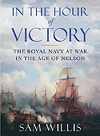
In the Hour of Victory: The Royal Navy at War in the Age of Nelson, by Sam Willis, W.W. Norton & Co., New York, 2013, $35
This volume is much more than a narrative of victories that established British pre-eminence at sea at the turn of the 19th century. With a newly discovered cache of dispatches from the fighting Royal Navy commanders of the era, Sam Willis adds connective tissue for—and intimate insights into—the dramatic events of a historic time.
In the Hour of Victory spans a series of Royal Navy battles fought between 1794 and 1806—the Glorious First of June, Cape St. Vincent, Camperdown, the Nile, Copenhagen, Trafalgar and San Domingo. Those seven clashes are identified as “a veritable golden age of British naval success.”
The newly discovered documents and Willis’ discerning commentary provide a penetrating view into events obfuscated by more than two centuries of event-oriented textbooks and sensationalized biographies. The author draws readers into the thought processes of such leaders as Admirals Richard Howe, Cuthbert Collingwood and, of course, Horatio Nelson. He also introduces several key civilian leaders and explores the frequently touchy relationships among the Royal Navy’s senior officers and their superiors. Along the way readers learn there was much more happening at sea for the British during the era than the astonishing exploits of the oft-lionized Nelson.
Such insights contribute to an “I’d never thought of that” aspect to this book. For example, Willis points out that accompanying the deep geopolitical strains of the era was a profound religious undercurrent, as Protestant Great Britain clashed with Catholic France and Spain. The author also examines Nelson’s effective doctrine of eyeball-to-eyeball action, an aspect of his leadership frequently overshadowed by his tactics and personal life.
Arguably the most important feature of In the Hour of Victory is, however, its “butchers’ bill” accounting of various battles, reminding us that war is brutal chaos involving individual human struggle, and its narratives are written in blood before it becomes history.
—Joseph F. Callo




